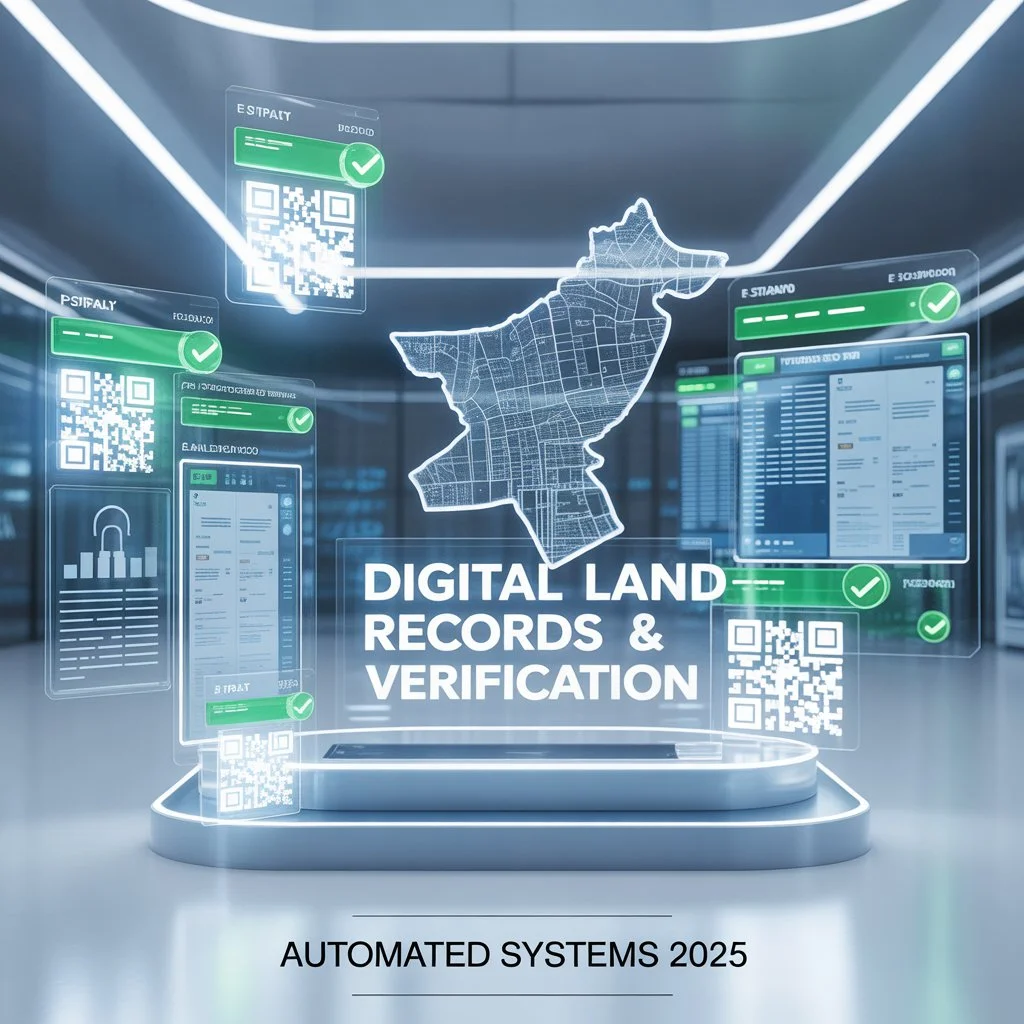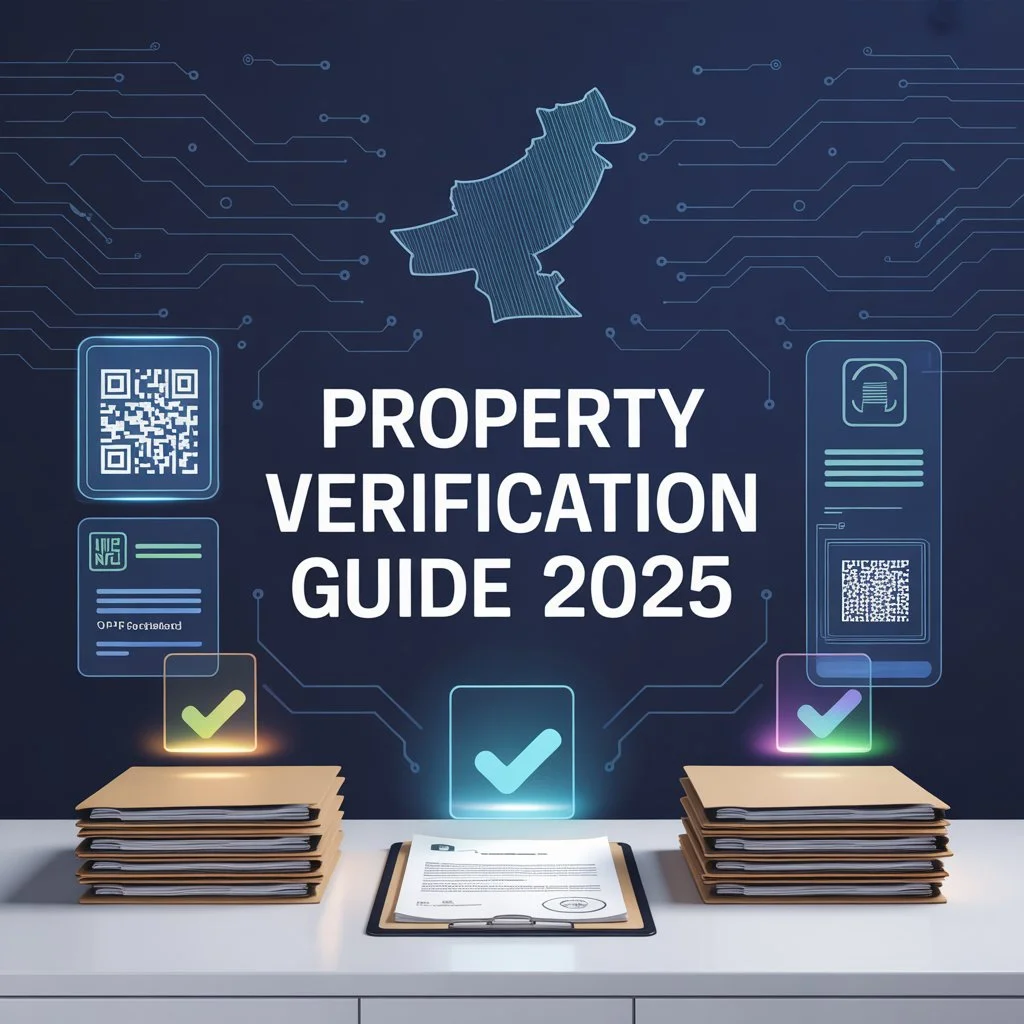The real estate Pakistan sector is undergoing a major shift as 2025 brings tighter rules, improved transparency, and stronger checks on every stage of property verification. With rising concerns about real estate fraud, illegal housing societies, fake property files, and loopholes in the land record system, the government and regulatory authorities are enforcing stronger measures to protect buyers and regulate the market. These changes affect how property tax Pakistan works, how transactions are recorded, and how quickly buyers can verify plot ownership. This property verification guide explains why real estate documentation has become more demanding and what every investor must know before making a purchase.
1. Crackdown on Fake Schemes and Fraudulent Transactions
One of the biggest reasons real estate documentation is stricter in 2025 is the ongoing crackdown on fake property files, duplicate allotments, and fraudulent registries. Regulators have identified several illegal housing societies operating without proper NOC verification, layout approvals, or development permissions. As part of anti-fraud property regulations, authorities require accurate recordkeeping, verified payment receipts, and digital confirmations for every step of the process.
Housing scheme NOC Punjab listings now include updated information on approved vs illegal societies, helping buyers avoid scams. Consumers can now conduct online property verification through portals offering land ownership confirmation, preventing double sales and fake receipts. This increased oversight ensures genuine investments and reduces the risk of dealing with unapproved projects that previously operated unchecked.
2. Strengthened Tax Compliance and New FBR Requirements
Another major factor driving strict documentation is the introduction of updated FBR property rules that emphasize transparency, valuation accuracy, and tax compliance. Real estate buyers must now follow detailed requirements before completing property transfers. The FBR valuation table 2025 has narrowed the gap between government-declared values and market prices, making it harder for parties to under-declare asset values to avoid property tax Pakistan obligations.
The latest FBR rules for property buying 2025 require all parties to maintain Active Taxpayer (ATL) status, provide NTN records, document source-of-funds, and meet new property transfer requirements. This compliance framework directly impacts how property registration works and eliminates loopholes that previously allowed tax evasion. Buyers and sellers must ensure they follow real estate documentation guidelines to avoid penalties or delays in processing.
3. Growth of Digital Land Records and Automated Verification Systems

The shift toward digital land records is another major reason Pakistan’s real estate documentation has become more rigorous. The Punjab Land Record Authority (PLRA), along with systems in KP and Sindh, has digitized vast amounts of land ownership data. Digital land record verification Punjab allows real-time checks of property details, helping buyers authenticate registry details, ownership history, and plot boundaries.
The e-stamping Pakistan system replaced old manual stamp papers, reducing the risk of fake documents. Land ownership confirmation is now conducted through automated systems that highlight mismatches, unauthorized transfers, or fraudulent modifications. This digitalization minimizes human involvement, prevents manipulation of files, and boosts overall real estate transparency 2025. Buyers can now access online records from anywhere, using modern property documentation tools designed for safe property investment.
4. Rising Pressure to Prevent Money Laundering Through Property Transactions
Real estate documentation has become stricter because Pakistan must meet international transparency commitments. Property transactions have long been a preferred channel for unverified cash movements, but updated compliance rules now enforce KYC procedures, restrict large cash payments, and require complete financial trails. Banks monitor real estate Pakistan transfers closely and file suspicious transaction reports when discrepancies appear.
Similarly, developers must create detailed buyer due diligence profiles, ensuring all customer information is verified. This includes banking records, identity checks, and proof of income sources. These measures are part of broader property verification rules that aim to curb unregulated money movements. Buyers and sellers must now maintain evidence of financial legitimacy before completing any transaction involving residential, commercial, or plot-based assets.
5. Increased Consumer Protection and Buyer Safety Measures
Another reason real estate documentation in Pakistan is stricter in 2025 is the strengthening of consumer safety laws designed to protect investors from misleading property file verification, unauthorized development, and false marketing claims. Approved society lists published by authorities guide buyers with accurate information so they can avoid risky projects. The illegal housing societies list helps clarify which projects lack government authorization.
Updated real estate rules for buyers 2025 require developers to obtain all approvals before selling. Property documentation checklist standards ensure all necessary documents are verified, from the initial file to the final registry. Buyers can now cross-check authenticity using property buying checklist Pakistan resources. These measures empower individuals to make informed investment decisions based on accurate and verified information.
How to Verify Property Documents in Pakistan (Quick Guide)
A property verification guide must include essential steps every buyer should follow:
- Verify NOC status through official government websites.
- Use digital land record verification Punjab or provincial portals for ownership checks.
- Confirm property registry details through automated systems.
- Check development approvals through housing scheme NOC listings.
- Compare declared values with the FBR valuation table 2025.
- Review payment receipts, maps, layout plans, and allotment details.
- Confirm legitimacy of the developer through safe property investment guidelines.
These steps align with modern property document standards and help buyers avoid problems during property registration.
Why Stricter Documentation Benefits Buyers
Even though real estate documentation is now more demanding, the benefits are clear. Strong regulations reduce real estate fraud, make property transactions more secure, and ensure compliance throughout the process. Digital systems improve accuracy, while e-stamp paper portals streamline formalities. Consumers gain confidence knowing the property they buy meets real estate documentation standards and is part of an approved development.
Conclusion
Pakistan’s real estate documentation landscape is changing rapidly as 2025 introduces stronger rules, digital verification tools, and accountability across every stage of property transactions. Stricter checks on property documentation ensure smoother, safer, and more transparent investments for all stakeholders. Whether you are purchasing residential property, commercial space, or plot-based assets, following this property verification guide helps you take informed steps based on verified and reliable information.
Want to know more? Check out Punjab Housing Scheme Verification Portal: A Game-Changer for Faisalabad Investors
Like, share and comment: Facebook, Instagram, Youtube and TikTok.





Join The Discussion